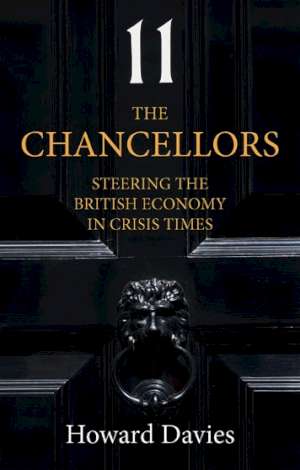25 July 2022
The Chancellors
Steering the British Economy in Crisis Times
Howard Davies
2022, Polity, 257 pages,
ISBN 9781509549542
Reviewer: William A. Allen, NIESR

Howard Davies’ new book is called ‘The Chancellors’, but it is really about Her Majesty’s Treasury and its fluctuating fortunes in the past quarter of a century. It is based on interviews, not only with ex-Chancellors, but also with other ministers, officials and special advisers, some named and some anonymous, and on Davies’ own experiences and knowledge. This provides a rich information base for a book which provides an always-interesting series of perspectives on a turbulent period.
The book lists several events which have had a big effect on the Treasury in those twenty five years: the independence of the Bank of England and the removal from the Treasury of the responsibility for monetary policy; the transfer in the opposite direction of government debt management; the financial crisis and its fiscal and regulatory consequences; Covid and its fiscal consequences; the publication of the Treasury’s advice to the government on the implications of an independent Scotland; the Treasury’s analysis of the case for the U.K. joining the euro; the publication of the Treasury’s assessment of the economic effects of Brexit; and Brexit itself.
Davies usefully draws attention to a serious problem which has arisen at the interface between monetary policy, managed by the Bank of England, and government debt management, which is the Treasury’s responsibility. Repeated application of quantitative easing by the Bank of England since 2009 has in effect shortened dramatically the maturity structure of the government debt. At the peak, the government’s liabilities included £895 million – equivalent to 36% of GDP – at zero maturity, representing the Treasury’s liability for the commercial banks’ reserve deposit balances at the Bank of England, swollen by QE. This is dangerous for two main reasons. First it exposes the public finances to serious interest rate risk. The balances bear interest at Bank rate, so that public expenditure is now very sensitive to the Monetary Policy Committee’s decisions about short-term interest rates. Second, there is a risk to the central bank’s independence, and a tail risk of fiscal dominance of monetary policy. The Treasury has consented to each application of QE and bears responsibility for the public finances, but the Bank of England is banker to the government, and as such should not act contrary to the government’s financial interests. Underlying all this is a failure of co-ordination between the Treasury and the Bank of England about an important matter of mutual interest. Perhaps it is feared that any co-ordination would be incompatible with the Bank’s independence; however, in truth failure to co-ordinate is the greater threat to the Bank’s independence.
The publication of the Treasury’s advice on the most important and most contentious policy issues of the period has dragged Treasury officials into politics alongside their ministers. The track record of the Treasury’s published analysis is excellent. The monumental body of work which led to the decision to stay out of the euro was of very high quality and proved decisive. Likewise the analysis of Scottish independence was, in Davies’ view, highly influential. The assessment of Brexit, derided during the referendum campaign as mere propaganda for ‘Project Fear’, is harder to judge, partly because the effects of Brexit have been partly obscured by those of Covid, and partly because the effects of Brexit are only just emerging.
The Treasury was caught badly short of people by the financial crisis. Its staff remain few in number and poorly paid. This has real costs. As Gus O’Donnell is reported as saying, national welfare would be considerably improved if half of the economists employed on monetary policy in the Bank of England were redeployed to work on tax in the Treasury. One wonders why this has not been somehow made to happen.
Periodically the Treasury has been threatened by the creation of a rival department of state responsible for economic growth. The Department of Economic Affairs, created in 1964, was the most serious threat. But it didn’t last long. Fundamentally, there needs to be central control of public spending, otherwise public spending will absorb more and more of the nation’s output, and outrun the state’s capacity to collect taxes. That way lies inflation, and for that reason the Treasury’s position is secure. Davies’s conclusion – ominously entitled
‘Trouble Ahead’ – lists seven challenges which the Treasury will have to face soon. There will probably be more. His book is both informative and entertaining, and I warmly recommend it.
